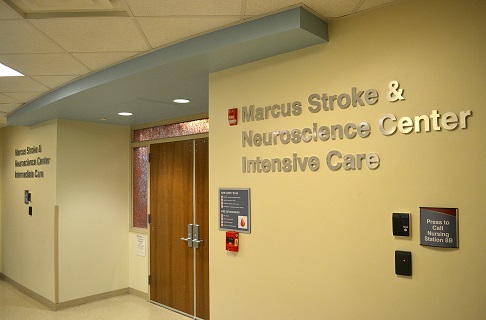Inside Grady Hospital’s Stroke Center

Catherine Mullins/WABE News
A stroke happens when a blood vessel bursts in your brain or when a clot blocks your brain’s blood supply. When that happens, every minute counts when it comes to saving brain tissue. Here in Atlanta, there are a number of hospitals qualified to successfully treat stroke. But if you’re having a major stroke, a national accrediting agency says Georgia only has three hospitals best-equipped to treat the most complex cases. This week, The Joint Commission, an independent accrediting agency, designated Grady’s Marcus Stroke & Neuroscience Center as an Advanced Comprehensive Stroke Center. Those who receive the recognition have significant resources in training, staff and infrastructure that allow them to provide state-of-the-art complex stroke care. WABE’s Michelle Wirth takes a look inside the center.
Doctor Michael Frankel checks Bill Alloca, who’s in his 50s, for telltale signs of stroke injury.
“Can you hold your arms up like this? Good. Just hold it up there for 10 seconds.”
Frankel is director and chief of neurology for the center and professor of neurology at Emory University. Alloca taps his thumb and forefingers on both hands as quickly as possible. On that day, Frankel sees only a minor sign and barely noticeable sign of stroke injury in Alloca’s left hand. It’s much better than two years ago when Alloca suffered a massive stroke in his Cobb County home.
“My body wasn’t working even though my mind was, and I fell to the floor, and I picked myself up, put myself up on the bed. When my wife came home from work she tried to wake me up. She realized there was something seriously wrong.”
Alloca was then rushed to a nearby hospital and airlifted to Grady. He was wheeled into the hospital’s stroke center and underwent a procedure where doctors used what’s called a merci retriever. It uses a corkscrew like coil to remove a blood clot in the brain.
“It was described to me it was still somewhat experimental in terms of the results.”
Alloca made it through the surgery and was able to go home several days later.
“I’m having dinner with my family two days later. It was a miracle is what it was, as if nothing happened with the exception of a little tenderness in my left hand.”
Alloca credits the stroke center for saving his life.
“All these people on this floor they’re the heroes around here, they’re the ones.”
And Frankel says Alloca isn’t the only complex stroke patient whom doctors at the center have been able to prevent from dying or suffering major injuries.
“We’ve had a number of amazing outcomes like that as a result of the therapy we’re able to offer.”
Since Frankel arrived at Grady in early 1990s, the hospital formed the first around the clock stroke team in the Southeast. Grady was also the first hospital in the Southeast to treat patients with a clot-busting drug that opens up blocked arteries. It’s called tissue plasminogen activator or tPA. The hospital also hosted a major clinical trial for the drug.
“We were one of only 7 sites around the country. It ended up being the first and still the only medication approved for patients with acute stroke symptoms. Now, it’s a standard of care around the country and it’s even a standard of care throughout the developed countries around the world.”
Since that time, Grady has trained hospitals around the state in stroke care and began using more advanced techniques such as catheter-based treatments that can go directly into blocked arteries and open them up. In March of 2010, the hospital opened its current state-of-the-art center, due to a multi-million dollar gift from the Marcus Foundation.
Today, the hospital has developed relationships with more than 60 hospital providers across the state, continues to participate in new stroke care research and treats nearly 1,000 patients a year. But Frankel says the most important thing in addition to treating strokes is helping to prevent them.
“You can do a lot to prevent yourself from having a stroke, seeing a primary care doctor, controlling your blood pressure, controlling your weight, not smoking. These are huge things that can be done. I think that’s the most important message of all.”
Besides Grady, Emory University and Georgia Regents Medical Center in Augusta are the other Georgia healthcare organizations which have been recognized as Advanced Comprehensive Stroke Centers.
From the CDC, the most common signs of stroke.
The National Stroke Association has an explanation of the different kinds of stroke (followed by a quiz) and much more.
And the National Library of Medicine has a web page featuring links to lots of articles and recent research about strokes.
9(MDAxODM0MDY4MDEyMTY4NDA3MzI3YjkzMw004))




